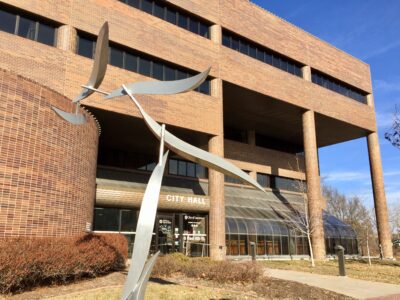Transportation manager travels the world
Lawrence resident Melissa Stultz spent the last few months in Doha, Qatar, helping manage the bus system for the 15th Asian Games.
Stultz works for Transportation Management Services, a company that provides transportation at major sporting events and conferences around the world.
In Qatar, Stultz helped game officials, athletes and their bodyguards get from the airport to their lodging places. Language often served as a major communication barrier, she said.
Stultz has lived in Lawrence for three years and earned a master’s degree from Kansas University. She grew up in Overland Park.
She married Brian Stultz in August 2005, and she travels around the world for her job with TMS to major events in the United States and abroad.
When she’s not preparing for an event, Stultz works for the American Red Cross and conducts CPR training and other classes.
Stultz returned home from the Asian Games on Christmas Eve and surprised family members.
While she was in Qatar, she corresponded with the Journal-World through e-mail.
Explain your job.
I manage the bus system from the airport to all accommodations throughout the city of Doha. My clients are the athletes, media, sponsors and guests, national Olympic committee members and technical officials.
How long have you been in Qatar, and what are your responsibilities?
I arrived in Doha on Sept. 2. I am one of 22 people who came specifically to help in the games’ bus-system area. There are four of us from that group who work at the airport.
They created a temporary terminal for people associated with the Asian Games. Once they arrive at the terminal and collect their luggage, they check on their accommodation. After they know where they are going, it is my responsibility to put them on the correct bus and ensure they get to their accommodation in a safe and timely manner.

Melissa Stultz, center, in Doha, Qatar worked with volunteers as she helped manage the transportation system for the Asian Games this fall in Doha, Qatar. She returned to the United States on Christmas Eve and surprised her family members.
Before the games started, we spent countless hours in the car designing routes for each of the 19 official accommodations. The challenge was staying off roads that we knew were going to be closed during the event. Once we had our routes designed, we had to train all the drivers on them.
You said it was a challenge to get the drivers to follow your routes. What else was difficult?
The other challenge was the language. The drivers come from a number of countries and cities: Singapore, India, the Philippines, Bangladesh, just to name a few. Some speak fairly good English, and some speak very little. It took time and patience to train all the drivers.
What other major sporting events have you worked?
The 2002 Salt Lake City Olympic and Paralympic Games, 2004 Super Bowl and the Kansas Relays.
What is your most favorite aspect of your job?
The excitement on working with such a huge event. Knowing that I take part in pulling an event of this size off.
What do you feel you have learned the most while working?
I have learned a lot about the culture here and how it is very different than the culture we live with in the United States. There are little things, like no one forms a queue anywhere.
At first I thought it was people being rude, I was pushed out of the way at many places. Later I learned that it is not their culture to wait. Whoever can get there first gets there first, even if they have to push you out of the way.
It was hard for me to be homesick at times because I have only been away from my husband for a little over three months. There are people (in Qatar) I know who have not seen their wife or kids for nine months, one year, sometimes even up to five years. It puts things into a little more perspective for me, although I still miss my husband dearly.
More from Do you Know?
- Lawrence couple celebrates golden anniversary (12-17-06)
- Birthday wish list: donating to others (12-10-06)
- Working with patients motivate AIDS project volunteer (12-03-06)
- Black Student Union leaders try to strengthen school’s unity (11-26-06)
- Writer instructs youngsters on the adventures of creating stories (11-19-06)
- Marine specialist works to help student veterans (11-12-06)
- Longtime poll worker ready for Election Day (11-05-06)
- LHS graduate promotes Kids Voting Kansas, civics education (10-29-06)
- Storyteller’s job spans country, world (10-22-06)
- The old barn (10-15-06)
- Shop owner relies on customers for inventory, a little help (10-08-06)
- Actor keeps busy working in ‘alternative’ theater outlets (10-01-06)
- ‘Normal life’ included World War II, ’51 flood (09-24-06)
- Mentor, eighth-grader become strong friends (09-10-06)
- Volunteer mans suicide hot line evenings at counseling center (09-03-06)
- Artist paints niche in bookstore setting (08-27-06)
- Volunteer reviews cases of children in tough positions (08-20-06)
- Exercise keeps seniors active (08-13-06)
- Volunteer encourages ongoing efforts to help city’s impoverished, homeless (08-06-06)
- Furniture store owner keeps business in city (07-30-06)
- Judge honored as groups celebrate milestones (06-30-06)



